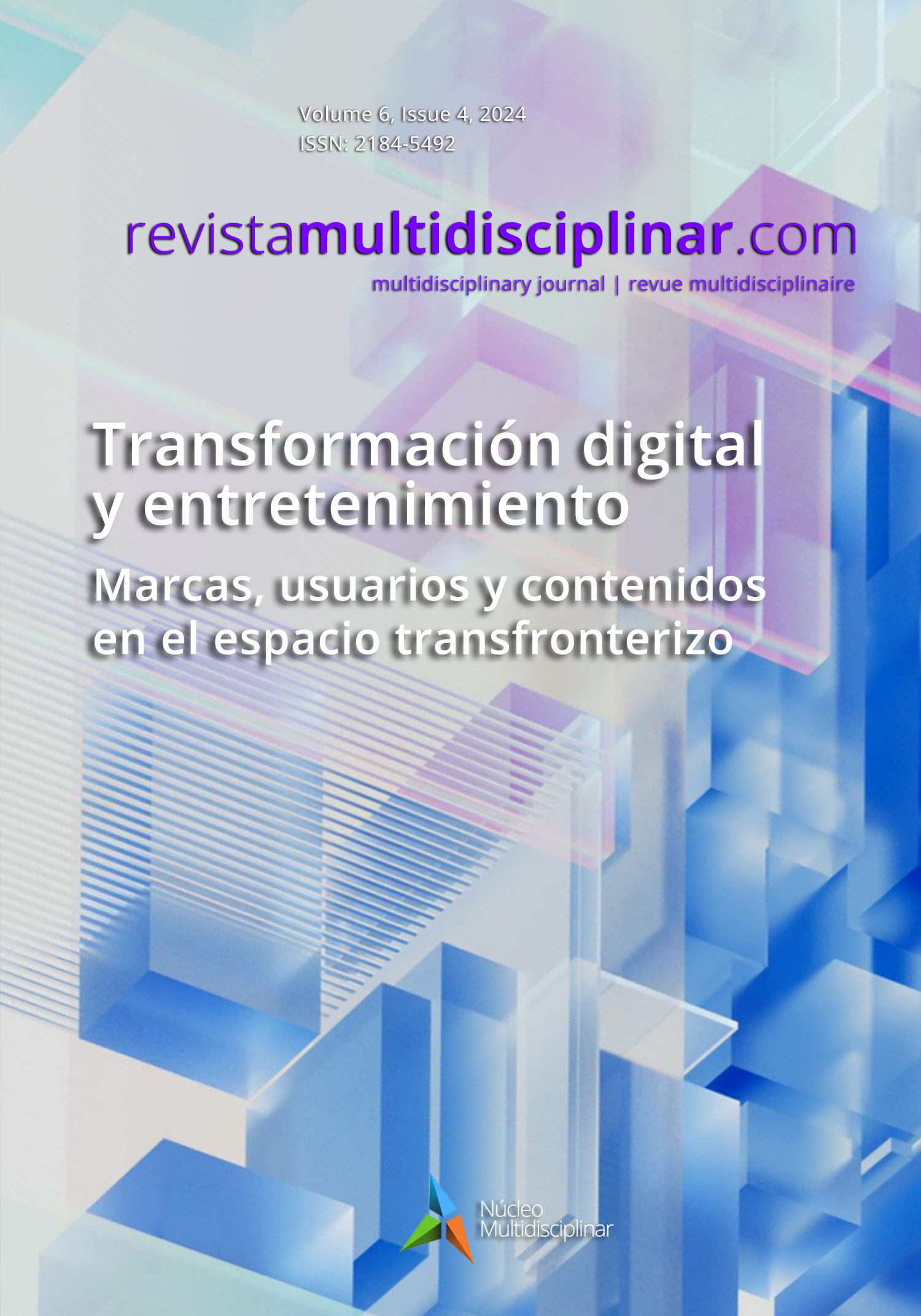Effects of algorithmic curation in users’ music taste on Spotify
DOI:
https://doi.org/10.23882/rmd.24258Keywords:
Spotify, algorithmic curation, digital platforms, calculated publics, taste, platformization, filter bubblesAbstract
This study addresses the potential impact of recommendation algorithms on Spotify users' musical tastes with the aim of understanding how algorithmic suggestions shape listening behaviors and preferences. A comprehensive review of the literature reveals that the presence of algorithms has contributed to reduced musical diversity and increased taste tautology among users. The results suggest that recommendation algorithms reinforce prior preferences, leading to the emergence of filter bubbles This algorithm-driven taste has obvious cultural implications and, with it, a large impact on the overall diversity of the musical experience. A qualitative methodology was used, consisting of a systematic literature review based on the PRISMA framework, identifying trends and key elements of existing studies. This study finds its limitations in the need for an additional quantitative study to delve deeper into the behavior of recommendation algorithms. Ultimately, this research underscores the need for greater awareness of the implications of music recommendation using algorithms in the digital age.
References
Anderson, A. Maystre, L. Anderson, I. Mehrotra, R. and Lalmas, M. (2020). Algorithmic Effects on the Diversity of Consumption on Spotify. In Proceedings of The Web Conference 2020 (WWW '20). Association for Computing Machinery, New York, NY, USA, 2155–2165. https://doi.org/10.1145/3366423.3380281
Andrejevic, M. (2012). Exploitation in the data mine. In C. Fuchs, K. Boersma, A. Albrechtslund, & M. Sandoval (Eds.), Internet and Surveillance: The Challenges of Web 2.0 and Social Media (1st ed., pp. 71-88). (Routledge Studies in Science, Technology and Society; No. 16). Routledge. https://doi.org/10.4324/9780203806432
Beer, D. (2009). "Power through the algorithm? Participatory web cultures and the technological unconscious." New Media & Society, 11(6), 985-1002. https://doi.org/10.1177/1461444809336551
Björklund, G., Bohlin, M., Olander, E., Jansson, J., Walter, C. E., & Au-Yong-Oliveira, M. (2022). An Exploratory Study on the Spotify Recommender System. In A. Rocha, H. Adeli, G. Dzemyda, & F. Moreira (Eds.), Information Systems and Technologies (pp. 366–378). Springer International Publishing. https://doi.org/10.1007/978-3-031-04819-7_36
Bonini, T., & Gandini, A. (2019). “First Week Is Editorial, Second Week Is Algorithmic”: Platform Gatekeepers and the Platformization of Music Curation. Social Media and Society, 5(4). https://doi.org/10.1177/2056305119880006
Cormen, T. H. (2009). Introduction to algorithms. Cambridge, MA: MIT press.
Dialnet. (n.d.). Cómo hacer una revisión sistemática siguiendo el protocolo PRISMA. https://dialnet.unirioja.es/servlet/articulo?codigo=8583045
Duffy, B. E. (2016). The romance of work: Gender and aspirational labour in the digital culture industries. International Journal of Cultural Studies, 19(4), 441–457. https://doi.org/10.1177/1367877915572186
Duffy, B. E. (2020). Algorithmic precarity in cultural work. Communication and the Public, 5(3–4). https://doi.org/10.1177/2057047320959855
Ferwerda, B., Boksjö, N., Petricioiu, N., & Wollny, C. (2023). What’s in a Name? How Perceived Music Playlist Personalization Influences Content Expectations. In IFIP Conference on Human-Computer Interaction (pp. 585-589). Cham: Springer Nature Switzerland.
Freeman, S., Gibbs, M., & Nansen, B. (2022). ‘Don’t mess with my algorithm’: Exploring the relationship between listeners and automated curation and recommendation on music streaming services. First Monday, 27(1). https://doi.org/10.5210/fm.v27i1.11783
Gillespie, T. (2010). The politics of platforms. New Media & Society. https://doi.org/10.1177/1461444809342738
Gillespie, T. (2014). The relevance of algorithms. In: Gillespie T, Boczkowski PJ and Foot KA (eds) Media Technologies Essays on Communication, Materiality, and Society. Cambridge, MA: The MIT Press, pp. 167–194.
Helmond, A. (2015). The Platformization of the Web: Making Web Data Platform Ready. Social Media Society, 1(2), 1-11. https://doi.org/10.1177/2056305115603080
Hesmondhalgh, D., & Meier, L. M. (2017). What the digitalisation of music tells us about capitalism, culture and the power of the information technology sector. Information, Communication & Society, 21(11), 1555–1570. https://doi.org/10.1080/1369118X.2017.1340498
Jacobson, K., Murali, V., Newett, E., Whitman, B., & Yon, R. (2016). Music personalization at Spotify. In Proceedings of the 10th ACM Conference on Recommender Systems (pp. 373-373).
Maasø, A., & Spilker, H. S. (2022). The Streaming Paradox: Untangling the Hybrid Gatekeeping Mechanisms of Music Streaming. Popular Music and Society, 45(3). https://doi.org/10.1080/03007766.2022.2026923
Martin, K. (2019). Ethical Implications and Accountability of Algorithms. Journal of Business Ethics, 160(4). https://doi.org/10.1007/s10551-018-3921-3
Mayer-Schönberger, V., & Cukier, K. (2013). Big data: A revolution that will transform how we live, work, and think. Houghton Mifflin Harcourt.
McCaffrey, M. (2016). Algorithmic culture and the taste tautology: How recommendation systems reproduce musical preferences. Journal of Cultural Studies, 30(1), 52-68. https://doi.org/10.1080/14797585.2016.1143895
Morris, J. W. (2020). Music Platforms and the Optimization of Culture. Social Media and Society, 6(3). https://doi.org/10.1177/2056305120940690
Morris, J. W., & Powers, D. (2015). Control, curation and musical experience in streaming music services. Creative Industries Journal, 8(2), 106-122. DOI: 10.1080/17510694.2015.1090222
Nieborg, D. B., & Poell, T. (2018). The platformization of cultural production: Theorizing the contingent cultural commodity. New Media & Society, 20(11), 4275–4292. https://doi.org/10.1177/1461444818769694
Pariser, E. (2011). The filter bubble: What the Internet is hiding from you. Penguin Press.
Poell, T., Nieborg, D., & van Dijck, J. (2019). Platformisation. Internet Policy Review, 8(4). https://doi.org/10.14763/2019.4.1425.
Prey, R. (2020). Locating Power in Platformization: Music Streaming Playlists and Curatorial Power. Social Media and Society, 6(2). https://doi.org/10.1177/2056305120933291
Prey, Robert. (2016). Musica Analytica: The Datafication of Listening. 10.1057/978-1-137-58290-4_3.
Raley, R. (2013). Dataveillance and Countervailance. In:‘Raw Data’ is an Oxymoron,ed. L. Gitelman, 121-1 46. Cambridge, MA:MIT Press. https://raley.english.ucsb.edu/wp-content/DV-uncorrected-proofs.pdf
Sifferd, J. A. (2002). The Peer-to-Peer Revolution: A Post-Napster Analysis of the Rapidly Developing File Sharing Technology. Vanderbilt Journal of Entertainment & Technology Law. Vol 4-1. Article 6. https://scholarship.law.vanderbilt.edu/cgi/viewcontent.cgi?article=1500&context=jetla
Snickars, P. (2017). More of the Same – On Spotify Radio Culture Unbound. Journal of Current Cultural Research, 9(2): 184-211 https://doi.org/10.3384/cu.2000.1525.1792
Union of Musicians and Allied Workers. (n.d.). Justice at Spotify. We Are UMAW. https://weareumaw.org/justice-at-spotify
Van Dijck, J. (2014). Datafication, dataism and dataveillance: Big data between scientific paradigm and ideology. Surveillance and Society, 12(2). https://doi.org/10.24908/ss.v12i2.4776
Van Dijck, J. Poell T. & De Waal M. (2018). The platform society: public values in a connective world. Oxford University Press USA - OSO. https://public.ebookcentral.proquest.com/choice/publicfullrecord.aspx?p=5520871.
Van Dijck, J., Nieborg, D., & Poell, T. (2019). Reframing platform power. Internet Policy Review, 8(2). https://doi.org/10.14763/2019.2.1414
Downloads
Published
How to Cite
Issue
Section
License
Copyright (c) 2025 Marta Ezquerra Fernández

This work is licensed under a Creative Commons Attribution-NonCommercial 4.0 International License.









